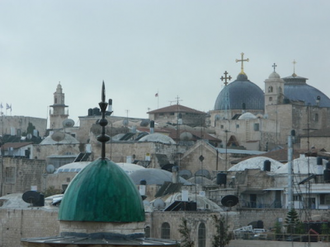Jerusalem Abbot: Don't treat Holy Land crisis 'as if it was a game'

Jerusalem's Old City © ACN
Source: Aid to the Church in Need
An abbot in the Holy Land has criticised the international community, accusing people of treating the crisis "as if it was a simple game" rather than responding to the urgent needs of families trapped in a "terrible situation".
Abbot Nikodemus Schnabel of Jerusalem's Benedictine Dormition Abbey told Aid to the Church in Need (ACN) that it is important to look at the conflict from a Christian perspective.
Abbot Schnabel said: "People are dying while the world watches as if it was a simple game, where one waves flags for one team or another. But this is a terrible situation. This is not a football match, and it's not about scoring points, seeing who has the most impressive stories or the best pictures."
He added: "At the moment we are living in a very polarised environment, there is a lot of pressure to pick a camp and make accusations, but if you do so you become part of this game. The reality is very complicated, with many 'footnotes', 'brackets' and 'parentheses'."
The abbot explained: "I am neither pro-Israel nor pro-Palestine. I am pro-human being. This is my theological position."
He highlighted the importance of the belief - shared by Christians, Jews and Muslims - that every human being is created in the image of God and deserving of respect and dignity, regardless of nationality or religion.
Abbot Schnabel said that there was a lot of dangerous rhetoric on both sides of the conflict, adding: "They don't talk about human beings. They say these are not people, they are monsters, beasts in human shape. There is a dangerous tendency to dehumanise the 'other'. They speak of 'neutralising' people - they don't say 'killing'.
"They talk about casualties in referring to the victims, as though they were mere statistics - they hide the fact that these are human beings, dying at the hands of other human beings."
He stressed the challenges faced by the Holy Land's Christian community, shaken by decades of division, violence and political conflict.
He said: "Many people think that Israel and Judaism are the same thing, and that they are the same as the Western world, and that the Palestinians equal Islam and the Eastern world. But even though they are only a small percentage, estimated at around two per cent of the population, Christians don't fit into this tidy arrangement, and suffer amongst the divisions, which have intensified because of the war.
The abbot added: "I get the feeling that some people think that without the Christians things would be simpler, because then we really would be left with this wonderfully black and white representation of the conflict. But the Christians are present, and on both sides, which complicates the narrative of a clear division between opposing forces."
Abbot Schnabel highlighted that, despite being largely ignored and marginalised, the Christian community in the Holy Land has an important role because it is the only faith group placing the message of forgiveness and compassion at the centre of its teaching.
He said: "We feel the pain and suffer with the people on both sides. We shed tears for both sides."
He concluded: "My point of reference is Holy Scripture, the Bible - that is where I learned from my Lord Jesus Christ that I should pray for those who hate me, pray also for those who commit crimes. It is a scandal to say so nowadays, but I do pray for the terrorists, and for all the others who are implicated in the conflict."
ACN has provided emergency aid - food coupons, life-saving medicine and help with housing costs and tuition fees - for more than 3,400 Christians in the Holy Land who have lost their livelihoods because of the conflict's economic impact.
With thanks to Maria Lozano


















